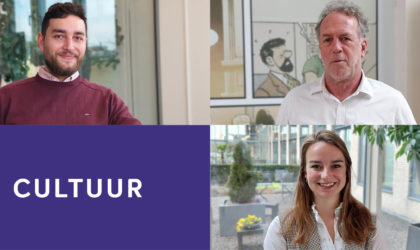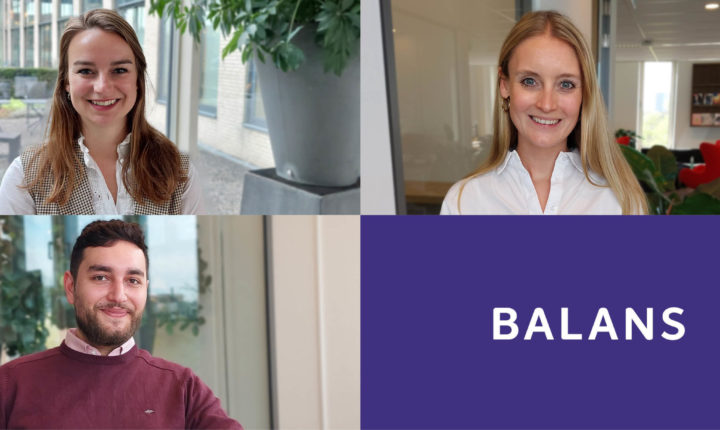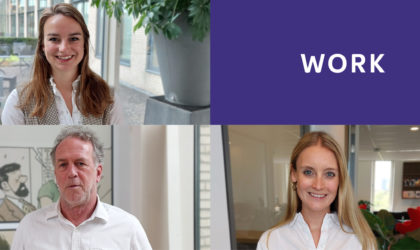
The culture at OPRG: Safe but dynamic
From the variety of the work, international network to working together in friendly teams, there are plenty of reasons why working at Omnicom PR Group (OPRG) is great fun. But…
September 20, 2022

The varied work, international contacts and lots of collaboration in fun teams: there are plenty of reasons why working at Omnicom PR Group is great fun. But what do Joost, Marly, Nathalie and Noa themselves actually think of working at OPRG? In a series of blogs, they talk about this. This week: the work-life balance at OPRG.
At OPRG, we work hybrid, partly at home and partly in the office. For Joost, Marly, Noa and Nathalie, this is the ideal combination.
Noa: “I find the work-from-everywhere policy super nice. At my previous employer you could get in trouble if you sat down in Starbucks with your laptop, so this is really a relief for me. I notice that many people are starting to understand that you go to the office mainly to work together and for the social aspect. If you really need to get something done, it’s much nicer to sit at home.”
Marly: “Sometimes I really think; ‘how did we do that five days here at the office?’ I find it quite tiring when I’m in the office all day. I love working at home, then I’m comfortable in my own bubble. Even though we work remotely, we still have a lot of connection with each other. And then when I’m at the office, I really enjoy having lunch together.”
Nathalie: “I do have to say that the more I work from home, the less I feel that connection with colleagues. Especially with new colleagues. You used to just run into each other, now you really have to consciously seek out contact. By the way, there is plenty of room for that, for example if you want to brainstorm with your team in the office. If I want to work things out on my own, I find it very pleasant to sit at home. “
Joost: “I freelanced a lot, so I’m used to working alone. At home I have a good home office with everything I need. My kids are out of the house, so it’s very quiet at my house. I have all the time and space. I find it ideal.”
On the question of how important it is to be a team-player at OPRG, Joost, Nathalie, Noa and Marly agree wholeheartedly; it is very important. Indeed, it is actually encouraged to work together a lot.
Joost: “All the work we do, we do in a team. Of course there are people who have specific qualities, such as Juriaan who does research or Chéline who is also involved in social media, and myself of course. But even then you need all those other colleagues around it as well.”
Marly: “I don’t think you can do your work here on an island by yourself. First of all, you have to deal with a client and its team, and besides that it’s usually big jobs that you always tackle together with your colleagues. I think it does help a lot if you enjoy working with colleagues.”
Noa: “You are also supposed to help each other. I think everyone likes to do that too. At my old employer it really wasn’t like that. If you then asked someone something, he or she usually pushed the request back under the guise of ‘I don’t have time’. Here it is rather the other way around. First you ask the other person what they need help with and then you see if they have time for it. You don’t have time? Then together you see if someone else has time and that’s how you solve it together.”
Nathalie: “At the same time, there is also real room for people who prefer to work independently. It can be both, but certainly in a more generalist role it is very important in my view that you are a real team-player.”
Noa: “When I was adding up all the clippings for client IMA for that month in January, I saw that all together there were more clippings in that month than in the whole previous year. I was involved in both press releases a lot, so when I sent that to the rest of the team, it did make me feel good. Or, for example, scrolling through that coverage tracker from Discovery after I finally entered everything. Coverage is something you can very easily express in numbers. That way you can see concretely what you have achieved.”
Joost: “Such a team outing makes you look at your colleagues – some of them, anyway – with completely different eyes. ‘Metamorphosis’, that describes it the best.”
Marly: “I think whether it’s digital or physical here in the office at the coffee machine, I think it’s very nice and important to discuss the weekend and catch up with each other.”
Nathalie: “That was really the Team Away Day of 2019 for me. I had only been working at OPRG for a few months so I didn’t know everyone very well yet. We then went to play Wie is de Mol and then BBQ’d on the beach. There was drinking, volleyball and swimming. It was really a super nice atmosphere and it wasn’t really about work, but much more about the people. I felt part of the team right away, even though I hadn’t been there very long. Still my favorite team moments are when it’s not about work. You get to know each other a little more personally then and this ultimately makes working together better.”
Teamwork, of course, also involves celebrating successes. What is the situation with this at OPRG?
Joost: “What I find remarkable is that we easily share our successes with each other. We are not so quick to claim credit for ourselves. You don’t easily hear ‘I did that’, but rather ‘we did this as a team’.
Noa: “Now for example with the European Excellence Awards we won, everyone is happy for each other and this is shared in joint meetings. “
Marly: “I think we have a culture where we compliment each other a lot. We give each other more compliments than feedback, so that might also be something to learn from. “
Noa: “As for really celebrating, I think there is still room for improvement. Especially within client teams. For example, I have never physically sat down with the entire Discovery team to have a beer and look back on the fact that we completed the job so successfully. Too bad, because that would be a lot of fun. Maybe before when you all worked in the office you did that more?”
Nathalie: “It varies a lot from team to team. Since we work hybrid, I think it has also changed. Back then, when there was something to celebrate, we often had a moment together in the kitchen. Everyone would get together, have a coffee and talk about it. Sometimes a team would open a bottle of champagne and drink a glass together. That doesn’t happen anymore. Too bad, we could indeed do that more often, for example when we win a pitch and win a customer. Especially celebrating those small successes creates a connection with each other.”
Marly: “I also think that it is what you make of it yourself with your team. Within my role as the person ultimately responsible for a team, it is also up to me to facilitate these kinds of things. I do and I hope that this is also seen. For example, last year, when we had completed a successful assignment for a health client, we ordered sushi with the whole team.”
Joost: “I haven’t been able to see or celebrate anything myself, even when bringing in clients. When we had won a pitch and thus won a new customer, people were very down-to-earth about it. Maybe it was because of corona. Yet I think it is also good that there is sobriety in the agency. I just came from an American agency and there everything is wonderful and amazing. That is a bit exaggerated, but here we could celebrate a bit more. Sometimes it’s okay to be proud of your work and dwell on that.”
Noa: “That varies a lot from week to week. There are weeks when I have time to spare and think ‘I really could have done more’. Other weeks, my agenda is overflowing and it takes up a lot of my time. I find it hard to really let go of my work. That brings me back to the team player story. As a result, I quickly feel embarrassed to say no if a colleague asks for something. To guard the boundary between work and private life better, I have now removed my e-mail from my phone. I didn’t have that before, plus my notifications were also on, and then I was checking my phone every time to see if I had missed something important. I would end up still reading my e-mail at ten o’clock at night. I still find it hard to set boundaries. But at some point it stops and I too have to sell ‘no’. I’ve really become a little tougher in that too.”
Marly: “I also think it’s a matter of good planning. That’s something you learn over the years. The more you are in charge of projects, the easier it goes. It’s easier to oversee what’s coming up. I try to make a rough weekly schedule at the beginning of the week so that I have an overview and know exactly what needs to be done and when. Of course other things come through sometimes, that’s just how it goes. But by creating an overview, I can let go of work better. When we still worked in the office every day, the bike ride from the office in Amstelveen to my home in Amsterdam helped me create distance. I literally left my work behind me physically. Now I try to do that in other ways. For example by cleaning up all my work stuff when I am done so that nothing in my house reminds me of work anymore. I put on different kind of music, light candles. That way I really feel that the working day is over.”
Nathalie: “I think the work-life balance at OPRG is essentially good. If you have had a very busy week, you are allowed to compensate hours, for example. During busy periods the balance is a little less good, but there are more quiet periods in return. Then again, you can take the time to do a little more exercise between work or do something else. In the evening I turn off my laptop and put it away. I do have my mail on my phone, but I don’t get notifications. When I’m on vacation, I take out my SIM card. Then I’m really not there for a while. I think that’s very important. Because we have a lot of ad hoc work, it often feels like things have to happen right away. Then I always ask myself the questions, ‘Do I have to do this now? Can someone else pick it up? Or maybe it can be done tomorrow?’ Usually it then turns out to be a little less urgent. “
Joost: “This is the easiest office in terms of workload where I have ever worked. By that I mean that it takes very good account of the amount of workload placed on people. Let’s say people here are taxed up to eighty percent. At other agencies where I’ve worked, things are really quite different. There, people are often taxed up to 110 or 120 percent. Of course people work hard here, but people are not pushed over the edge. The other day there was a discussion about your work phone and whether it can be turned off at night. As far as I’m concerned, you can just call, I don’t care. This is also because of that whole work-life balance story. If you can work from home, you can also go shopping during the day, for example. I think there should be something in return, so if I get a call in the evening: why not?”
Noa: “Just preparing my sales pitch. Come work at OPRG! It’s a super nice environment, you can learn a lot and everyone is helpful. You always feel appreciated and if you bring something in, it’s really taken seriously.”
Joost: “If you want to work at an honest agency that takes its own development as an agency seriously and has a broader view of communications, then you should join us.”
Marly: “If you like diversity, learning quickly, making great plans and working with great people, then you should come to us. Also very important is the international aspect. I think ninety percent of my work is in English. So is ninety percent of my customer contact. I really like the fact that my work goes beyond the Dutch borders, so if you like that you’ve come to the right place.”
Nathalie: “If you are a real team player, like fun and are looking for a dynamic job with lots of variety and lots of contact with colleagues and clients, OPRG is the right choice.”
Joost is Creative Strategy Director (CSD) and has been working at OPRG for about five months now. As CSD, he is responsible for the creative strategy of campaigns. What does the client want to achieve and what is needed to do so? Joost then comes up with a positioning idea. That in turn is translated into a concept.
Marly is Senior Account Lead and has been with OPRG for almost five years. She is the first point of contact for clients. She then devises a campaign based on the client’s request. In cooperation with her team, she then brings it to a successful conclusion.
Nathalie has been working for OPRG as a Client Advisor for almost three years now. She is a true generalist and works for a variety of clients; from corporate to lifestyle. Also in terms of tasks, she is at home in all markets. Creating strategic communications advice, marketing, organizing events, influencer marketing and content marketing, she does it all. She also maintains media relations for many clients.
Noa is a Client Executive and has been working for OPRG for almost six months now. He usually works for five different clients at the same time. No workday is the same with him. One day he writes a press release and updates the media list, yet another day he does research and liaises with stakeholders.

From the variety of the work, international network to working together in friendly teams, there are plenty of reasons why working at Omnicom PR Group (OPRG) is great fun. But…

In this second blog of a series, our colleagues tell you more about the variety of work they are working on, but also which work they are most proud of.